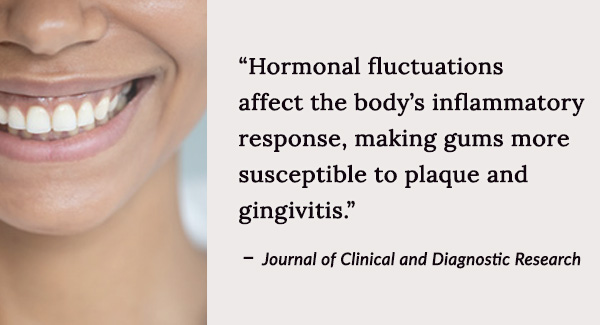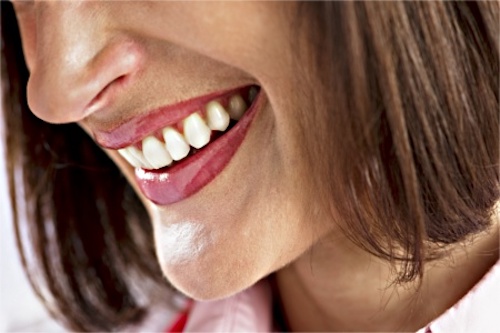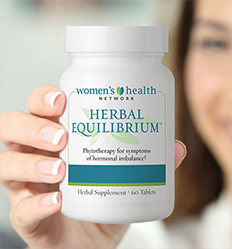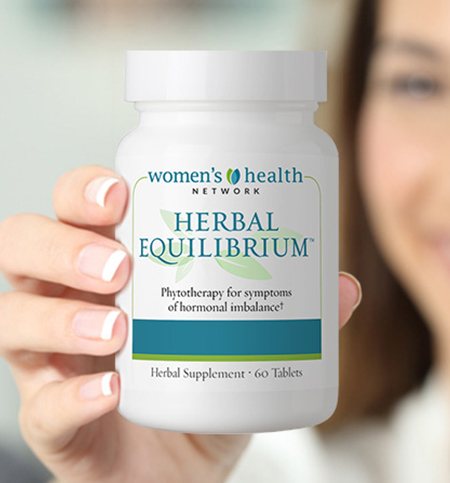Authored by Dr. Sarika Arora, MD
Even though I’m a doctor rather than a dentist, I always make sure to talk with my patients about the health of their teeth and gums. That’s because your dental health has a huge effect on your overall health, including the little-known connection between bleeding gums and hormonal imbalance.

Do your gums bleed when you brush your teeth? Do a quick smile test and check: are your gums receding? If so, it’s worth figuring out what’s going on and what you can do.
Why do your gums bleed more in menopause?
Women in perimenopause and menopause are more likely to develop bleeding gums and other symptoms of gum disease for one simple reason — inflammation. But it works the other way around, too — poor oral hygiene that leads to bleeding gums can activate and elevate the inflammatory response so that inflammation becomes systemic. This sets the stage for developing hormonal imbalance and menopausal symptoms.
Let’s dig into why hormonal imbalance is tied to gum disease — and vice versa.
Fluctuating estrogen levels lead to gum disease and inflammation
Studies show that estrogen can suppress inflammation in certain cells of the body. As estrogen fluctuates during perimenopause, some of this anti-inflammatory protection disappears. During perimenopause, unhealthy lifestyle habits such as poor nutrition, lack of exercise and unmanaged stress can have a greater impact on your oral health than when you were younger.
So even if you are practicing good oral hygiene by brushing and flossing every day, you might still develop bleeding gums.

Gum disease and inflammation leads to hormonal imbalance
If you didn’t develop regular brushing and flossing habits when you were younger, the accumulated inflammation in your gums over the years could be promoting chronic inflammation throughout your body and causing hormonal imbalance.
More and more we’re seeing how periodontal disease affects your entire body. In fact, bleeding gums may be a signpost to other inflammatory issues that go beyond hormonal imbalance. These include serious, often hidden health concerns like metabolic syndrome, cardiovascular disease, osteoporosis or autoimmune disorders.
Healthy lifestyle habits promote normal levels of estrogen and progesterone which benefit your oral health by increasing blood flow to your gums, as well as changing your sensitivity to plaque on your teeth and bacteria in your mouth. Hormonal changes may also cause dental symptoms at other points in a woman’s life, including puberty, menstruation, pregnancy and during the use of birth control pills.
5 signs of hormonal imbalance connected to your dental health
- Bleeding gums
- Swollen gums
- Red gums
- Receding gums (a sign of bone loss in the jawbone)
- Dry, burning or painful mouth
What should you do?
Be consistent with dental hygiene
If you aren’t consistently brushing, flossing and seeing your biological/holistic dentist already, now’s the time to commit to upping your dental hygiene efforts. And keep them at the top of your priority list even when you may start to think “I’m in a rush, I’ll floss tomorrow.”
When you’re suffering from bleeding gums as well as other menopausal symptoms, you’ll want to do more than just increase your brushing and flossing. Of course, you should continue to see your dentist, but you may need to look at a system-wide solution to inflammation in your body.
Reduce consumption of inflammatory foods
I tell my patients that one of the most important steps for cutting down inflammation is to reduce the amount of sugary foods they eat. (This step is dentist-approved too.) Other inflammatory foods include processed meat, fried foods, excess alcohol and any food for which you have an allergy or intolerance. For an overall anti-inflammatory food plan, the Mediterranean diet is a great choice and can make a big difference in helping to calm other menopause symptoms too.
The message from your mouth could simply be that it’s time to take better care of yourself — by focusing on balancing your hormones and reducing the factors that lead to systemic inflammation in order to help both your gums and the rest of your body.
For more ideas on how to reduce harmful inflammation, read our article 7 steps to an anti-inflammatory lifestyle by Dr. Amber Hayden, DO. You’ll see the advice for brushing and flossing your teeth on a regular basis is at the top of the list too!
- https://www.nature.com/articles/nri3785
- https://www.nature.com/articles/srep15224
- https://onlinelibrary.wiley.com/doi/10.1111/prd.12033/full
- https://onlinelibrary.wiley.com/doi/10.1111/prd.12135/full
- https://onlinelibrary.wiley.com/doi/10.1111/jcpe.12335/full
- https://www.tandfonline.com/doi/full/10.1080/14779072.2016.1202112
- https://link.springer.com/article/10.1007/s00784-016-1935-8
- https://www.mouthhealthy.org/en/az-topics/h/hormones
- https://my.clevelandclinic.org/health/articles/11192-hormones-and-oral-health
 | Are your symptoms being caused by hormonal imbalance? Find out now by taking our quick quiz. |











